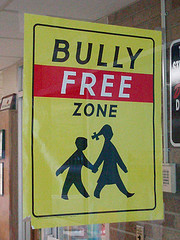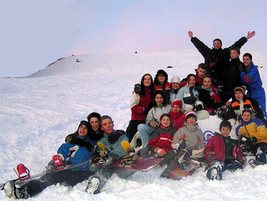|
Welcome to the latest follow up article to my Important New Year's Resolutions for Parents of Teens blog! Here you will find information on the benefits of getting teens involved in their community and ideas about how to get your family started!  Teens who are involved in community activities experience many benefits! Here are just a few: Investment in their community. Teens are able to use their time and talents to engage with others. They may also gain a better understanding of people who are different from them. Role models. Coaches, volunteer supervisors and mentors can provide a safe, positive example to teens. Self confidence. Teens' confidence in themselves will soar as they learn new skills, improve their ability to solve problems and develop leadership skills. Additionally, seeing that they make a difference can be deeply gratifying. Good work ethic. The University of Nevada Extension Office states, "young people involved in community service are more likely to have a strong work ethic as an adult." They learn how to be accountable, make and keep commitments and work well with others. Some pointers as you begin this journey: Find out what activities interest your child. Talk to them and allow them to drive the decision-making process. The more empowered your teen feels from the beginning, the more invested they will be in the -chosen activity later! For indecisive teens, parents may need to be more involved in the decision-making and planning process. Consider your teen. Take their personality into consideration. Not every child will be comfortable playing sports or stepping right into a leadership role. Help them find something that will build upon their strengths. Help them get started. Some teens may be more comfortable starting an activity with the presence of their family. Allowing them to invite a friend along may also boost their confidence heading into a new experience! Consider and manage the risks. Do your research on the organization and meet the adults who will be supervising, leading or coaching your child. Also, talk with your child about their experience on a regular basis to ensure they are safe and comfortable in their chosen activity. Finally, here are a few options to consider with your teen: Sports teams and lessons. Check out your teen's school, the YMCA or local recreation centers. Academic clubs. Mentoring programs. Hobby-based groups. Think chess club, music and theater. Community organizations like 4-H, Girl Scouts and Boy Scouts. Church youth groups. Volunteer opportunities. Hospitals, food banks and animal shelters are often looking for volunteer help. Picture from Flickr. Some rights reserved by Rob Gallop. Bethany Raab is a Licensed Clinical Social Worker in Denver, Colorado.
This week I want to address the second topic covered in my New Years Resolutions blog last month: Sexting. Just to be clear, “sexting” is a combination of the words “sex” and “texting.” It is defined by Urban Dictionary “the act of text messaging someone in the hopes of having a sexual encounter with them later; initially casual, transitioning into highly suggestive and even sexually explicit.” These messages may also include pictures of one self. The Merriam Webster Dictionary includes a similar definition.  It is important for parents and teens to be aware of the risks of sexting behavior. A 2012 study cites states “among girls, the use of sexting behaviors appears to coincide with much higher engagement in risky sex behaviors.” The risk is not limited to teen girls. Did you know that over 75% of teens who are propositioned to have sex via a text, actually end up having sexual intercourse? You are likely already aware of the risks sexual activity including teen pregnancy, contracting HIV or a sexually transmitted disease. Sexting can also have legal ramifications. For example, a teen girl sending a sexually explicit picture of herself to her boyfriend is not illegal (though not a good idea). However, the boyfriend then sharing the picture with one or more people can lead to big problems. This can be considered distribution of child pornography and can carry a prison sentence and the sender being required to register as a sex offender. Psychology Today published an article about the legal concerns with sexting. Here are some suggestions for parents:
Image from Flickr. Some rights reserved by Jhaymesisviphotography. Bethany Raab is a Licensed Clinical Social Worker in Denver, Colorado.
If, as you read, you begin to think that your family might benefit from making changes in one or more of these areas, do not worry! It is never too late to take action. See each step below for specific examples on how to bully-proof your child!
Finally, check out my 2012 blog article on helping kids know what to do if they are bullied or witness someone else being bullied. Click here to read more. Image from Flickr. Some rights reserved by Eddie~S. Bethany Raab is a Licensed Clinical Social Worker in Denver, Colorado.
Parents, this one is for you. We all make our lists at the beginning of the year of things to start, things to stop and things to improve upon. These goals are generally made in the spirit of self-improvement. I’m curious, how many of your resolutions involved your habits as a parent? What do you see as areas for improvement in your role as a parent? While you think about your own parenting resolutions, I have three suggestions for you to consider as you begin 2014 and seek to make it a great year for you and your family! I’ll start with the not-so-fun resolutions. Talk to your children about bullying, both in-person and online. This is a very real issue that can have a devastating impact on kids, both those being bullied and those who are the bullies. Check out the Stop Bullying website for more information. Talk to your teens about their experience at school. Ask about bullying. Find out who the bullies are and who is being targeted. If you find out that your child is being bullied or is doing the bullying, talk to them about their experience. It can be helpful to talk to the school or have your child see a counselor. However, it is most important to hear your child’s perception of what is happening to know how to best proceed. Talk to your teens about the risks of sexting. Let’s start out by defining what “sexting” means. According to Psychology Today, “sexting is sending, receiving, or forwarding sexual photos or sexually suggestive messages through text message or email.” Did you know that over 75% of teens who are propositioned to have sex via a text, actually end up having sexual intercourse? Did you know that a teen sending a sexually explicit picture of themselves to another person can be considered distribution of child pornography? Did you know that a child as young as 10 years old can be charged with a sexual offense in Colorado? If you didn’t know, it is likely that your teens do not know either. It is time to include a discussion about technology in the “birds and the bees” talk. Here is a great article to get you started. Now that those are out of the way, I’ll end with a more “fun” resolution! Help your kids get involved in an extracurricular activity. Many teens naturally find their way to fun and appropriate extracurricular activities. Others may have a more difficult time getting involved. Here are a few benefits of teens being involved in social activities: healthy friendships, improved self-esteem and good role models to name a few. They are good for parents, too! Not only can you feel good about your teen getting all of the above-named benefits, you might just get a little time to yourself, too! Here is a great article on helping your kids get involved. All of this being said, these conversations will be easier and more meaningful for both parents and teens who feel safe and comfortable talking to one another. I encourage you to foster an environment in your home where it is safe for your teen to talk to you about anything. Yes, anything! Thanks for reading today! Check back over the next few weeks as I blog about each of the above mentioned topics in more detail! Bethany Raab is a Licensed Clinical Social Worker in Denver, Colorado.
1) Go ice skating. 2) Write a letter to a friend or family member who lives far away. 3) Make a Christmas Carol music video. 4) Create place cards or other decorations for your family’s holiday celebration. 5) Bake cookies with friends. 6) Help a younger sibling write a letter to Santa. 7) Go sledding (or snowboarding or skiing!) 8) Have a holiday movie marathon. 9) Learn how to make a traditional family dish. 10) Wrap your bedroom door in paper or foil so it looks like a present. 11) Drink hot chocolate while reading a good book. 12) Turn off all lights except the Christmas tree lights. Relax in the quiet room or listen to music. 13) Volunteer time at a local charity. 14) Learn how other cultures and religions celebrate important holidays. 15) Bundle up and go for a walk to admire holiday lights in your neighborhood. Here are some links to websites that inspired this list and for more ideas! Parenting Teens: 50 Fun Holiday Activities Your Teen Will Love Parenting Teens: 101 Fun Things for Teens to Do This Winter Parent Map: 15 Meaningful Holiday Traditions and Fun Family Activities Here are some fun ideas for parents, too! Real Simple: 50 Fun Winter Activities Image from Flickr. Some rights reserved by katushya Bethany Raab is a Licensed Clinical Social Worker in Denver, Colorado.
 Thanksgiving is upon us and I wanted to offer a few thoughts on the benefits experienced by teens who express gratitude. 1) Increased happiness and overall well-being A research study by the American Psychological Association found that teens, like adults, experience a variety of benefits from the act of gratitude. The author of numerous studies about gratitude, Giacomo Bono, PhD, psychology professor at California State University, had this to say about the benefits of gratitude in high school aged teens: “Increases in gratitude over a four-year period were significantly related to improvements in life satisfaction, happiness, positive attitudes and hope.” According to the Harvard Medical School, “gratitude is strongly and consistently associated with greater happiness. Gratitude helps people feel more positive emotions, relish good experiences, improve their health, deal with adversity, and build strong relationships.” 2) Lower occurrence of depression symptoms Teens who express gratitude on a regular basis typically report fewer symptoms of depression. Giacomo Bono, PhD, suggests this is a result of being connected and reminded of the good aspects of one’s life. "People who are grateful are more optimistic and hopeful, feeling they have the resources to be successful in their future," said Bono. Click here for more information. The same goes for adults: researchers at York University in Toronto found that depressed study participants who completed a “gratitude exercise” every night, were less depressed six months after the study was complete. 3) Greater contributions to society According to a 2010 study of gratitude in teens by Froh, Bono & Emmons, "gratitude ignites a passion for helping others and contributing to society." The study indicates teens that are grateful tend to be more connected to their communities and want to give back, both as teens and later as adults. So how can you reap the benefits of gratitude? Here are some ideas:
Happy Thanksgiving! Photo from Flickr. Some rights reserved by woodleywonderworks. Bethany Jones Raab is a Licensed Clinical Social Worker in Denver, Colorado.
I am officially up and running as a provider for the Children's Health Plan Plus (CHP+)! I am accepting new clients at this time. Please spread the word!
Please note: I am only able to accept CHP+ plans that are managed by Colorado Access. Now that January is almost halfway over, how many of you are still on track with your New Years resolutions? It is common for the excitement of the new year to wear off as your family returns to the routine of work and school. It is just as common for the motivation to meet resolutions to diminish.
Now is a good time to re-evaluate your resolutions. Why have you abandoned your well-meaning resolutions? As discussed in the last blog entry, maybe your goals were not realistic or perhaps you did not have a good plan and support system in place. Take some time to read through my resolutions blog and get a more realistic plan set. You can do this! If you need a little extra support, Bethany is here to help. Give her a call at 720-722-0527, email her or fill out the contact form to get started today! Happy New Year! 'Tis the season to examine our progress over the last year and make resolutions for the new year. Many people make resolutions with good intentions but fail to follow through in the long run. Why is this? Perhaps it is because the resolutions are not realistic. Maybe some people do not have a way to hold themselves accountable to their resolutions. Here are a few simple ways to make those resolutions reality!
Write it down. The first step in making a resolution is to ensure you remember your goal! Post your resolution on the fridge, the bathroom mirror, in the car, even as a reminder in your phone! This will ensure you have not forgotten about your goals by the end of January! Be realistic. One of the biggest barriers to accomplishing our New Years' resolutions is not having a realistic goal. Losing 50lbs by your spring vacation may not be realistic. Choosing to exercise regularly and eat better will help you lose weight and feel better by the time you leave for your trip. Quitting smoking cold turkey may not be realistic for everyone. Choosing to use a cessation aid (i.e. nicotine gum or prescription medication from your doctor) may help get you started on a realistic plan to quit. If you aren't sure how to make your specific goal realistic, you might want to do some research. Read about the topic and talk to your friends, family, doctor or therapist for help! Baby steps. Keeping resolutions and meeting goals is all about action steps and meeting smaller daily, weekly and monthly goals. What specific steps do you need to take to achieve weight loss, improved health, better relationships, debt reduction or any other resolution you have chosen? Break it down, write it out and get started! Accountability. You don't have to do this alone! Talk with your loved ones about your resolution. Is there some way they can aid in the process? Don't be shy, ask them to help! Some resolutions may require professional help from a financial planner, personal trainer, doctor or therapist. The sooner you get your team of helpers into place, the sooner you will be on your way to meeting your goals. Do you, your child, teenager or family have resolutions but need help putting them into action? Bethany can help! Give her a call at 720-722-0527, email her or fill out the contact form to get started today! It is hard to believe that it is the end of September and most Denver-area schools have been in session for over a month. How is your child doing in school? What problems, if any, have you and your children come across? Has your child revealed they are being bullied at school? Or have you learned that your child is bullying his or her classmates? This entry is the first in a 2 part series about bullying.
18.8% of Colorado kids have been bullied at school according to the Colorado Healthy Kids Survey and the Colorado Legacy Foundation (CLF). CLF research shows that kids who are bullied experience a variety of symptoms including poor school attendance, low grades and low motivation to pursue higher education. More serious consequences can include drug use, depression, suicidal ideation and suicide attempts. Parents and their kids both play an important role in standing up to bullying. Experts at Children’s Hospital Colorado (CHC) suggest that parents offer support if their child discloses they are being bullied. This is important as many children are hesitant to reveal they are being bullied for fear of being blamed for the bullying. Stopbullying.gov recommends that parents avoid placing blame on their child and provide a safe environment for the child to discuss what has been happening. Parents asking their children what they believe may be helpful to alleviate the bullying can also be beneficial. Parents may ask that school officials intervene. School counselors and staff can help children create plans to deal with bullying. Schools can also help mediate between the child and the bully. Parents should also be aware that the Colorado State Legislature passed a Bullying Prevention Law in 2011. This allows legal action to be taken in cases of bullying. Stopbullying.gov also recommends some specific actions for a child who is being bullied:
Finally, a child that has been a victim of bullying may benefit from speaking to a mental health professional about their experience. Bethany is available to work with children and families dealing with bullying. Whether your child has been bullied, or is the bully, Bethany can help. You can contact Bethany by phone at 720-722-0527 or send her an email to get started. |
Welcome!
Every blog post you see on this page is written especially for teens and their parents! Like it? Pin it!
Follow me!
Categories
All
|



 RSS Feed
RSS Feed